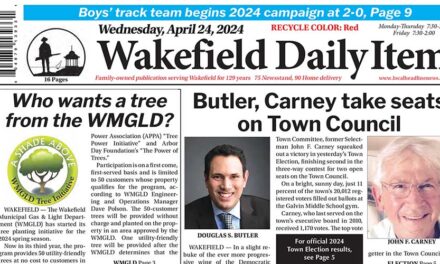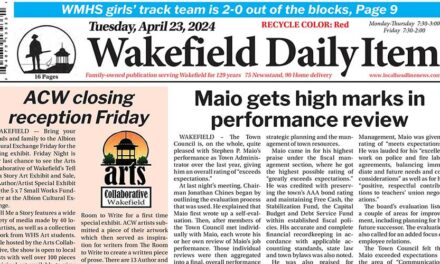By MARK SARDELLA
WAKEFIELD — Superior Court Judge Robert Ullmann is expected to issue a decision this week regarding the complaint by Robert Mitchell of Spaulding Street that the town (specifically Town Moderator William Carroll) violated his rights and the Town Charter when Carroll refused to allow Mitchell’s motion to adjourn at the Nov. 17, 2014 Regular Town Meeting.
A hearing on the matter was held last Friday at Middlesex Superior Court in Woburn. The judge took the matter under advisement and is expected to issue a decision early this week.
Town Counsel Thomas Mullen presented the town’s opposition to Mitchell’s complaint. Town Moderator William Carroll and Town Administrator Stephen P. Maio were also present at the court hearing.
Mitchell presented his own complaint at the hearing and was accompanied by attorney Alan Grenier, Daniel Lieber and Julie Scott.
In addition to the violation of the Town Charter, Mitchell alleges in his written complaint that town officials, specifically Carroll, violated his civil rights and those of everyone at Town Meeting by refusing to allow a substantive vote on his motion to adjourn.
Article 12 on the Nov. 17 Town Meeting warrant was a citizens’ petition filed by Mitchell and others to amend the Zoning Bylaw to limit to 30 feet the height of any building in the Assisted Living Overlay District. Mitchell has been a vocal opponent of a proposal by Shelter Development to construct a four story, 130-unit Brightview Senior Living Facility on Crescent Street.
Because Article 12 was a zoning article, a substantive vote could not occur at Town Meeting until after the Planning Board held a public hearing and issued a recommendation for or against the article. At a meeting on Oct. 28, Planning Board members said that due to the late filing of the petition there was not enough time to meet legal posting and notice requirements and hold a public hearing before the Nov. 17 Town Meeting. They scheduled the hearing for Nov. 25.
At that hearing on Nov. 25, the Planning Board recommended against favorable action on Article 12. But by that time, Town Meeting had already voted “indefinite postponement” of Article 12, which means it cannot be considered again for two years.
At the Nov. 17 Town Meeting, Mitchell attempted to make a motion to adjourn until Dec. 1, which would have been after the Planning Board hearing, so that a “yes” or “no” vote could be taken on Article 12.
In his court complaint, Mitchell contends that a motion to adjourn takes precedence over all other matters and that Carroll should have allowed his motion for adjournment to be voted on by Town Meeting.
Mitchell contends that “town officials did not act in good faith in their refusal to allow a vote to adjourn.” His complaint seeks to have the court “order that the Town Meeting be reconvened for a substantive vote on Article 12.”
But in its opposition to Mitchell, the town maintains that for a number of reasons Mitchell is not entitled to the injunctive relief he is seeking from the court.
The town contends that Mitchell’s motion to adjourn was improperly made, as he rose to demand a point of order while Town Counsel Mullen was at the podium discussing another motion. The town cites Roberts Rules of Order, which states that a motion to adjourn “is out of order when another has the floor.” When Carroll asked Mitchell what his point of order was, Mitchell said he wished to move for adjournment to Dec. 1.
The town says that Carroll told Mitchell that he had not raised a valid point of order and that a motion to adjourn cannot be made while another voter is speaking. At that point, Mitchell sat down. The town argues that a motion to adjourn cannot properly be made as a point of order.
If Mitchell believed that Carroll had erred in his ruling, he could have exercised his right to appeal the Moderator’s decision to the entire Town Meeting as a body. Mitchell requested no such appeal.
The town further maintains that during a subsequent 45-minute debate on a motion to indefinitely postpone Article 12, the moderator twice recognized Mitchell to speak. At either of those times, the town asserts, Mitchell could have properly made a motion to adjourn but did not make such a motion.
Even after Town Meeting voted in favor of indefinite postponement of Article 12, the town argues, Mitchell still could have moved to adjourn Town Meeting. If successful, Mitchell or any voter could have within 24 hours filed in writing with the Town Clerk a motion for reconsideration of Article 12. This avenue was not pursued and Town Meeting was dissolved after completing its business, ending any possibility of reconsideration.
“The plaintiff (Mitchell) cannot claim to be aggrieved by the Moderator’s application of the rules since he failed to avail himself of the remedies provided by those rules,” the town asserts on its argument before the court.
The town also argues that, absent evidence of malice or dishonesty, a town moderator’s decisions are beyond judicial review. Mullen cites case law to bolster the argument that “The judgment of the moderator if made in good faith, even if mistaken, [is] not subject to review by the court.”
The town points to the fact that Carroll sought and followed the advice of Town Counsel as evidence that Carroll acted in good faith in ruling Mitchell’s motion to adjourn improper.
The town also casts doubt on the notion that Mitchell would suffer “irreparable harm” if injunctive relief is not granted by the court.
“There is no reason to believe,” the town argues, “that if asked to re-do Article 12, the voters of the town would respond differently than they did the first time, when they voted by better than 2-1 to reject the article.”
It would also not be in the public interest, the town maintains, for any Town Moderator’s rulings to be subject to second-guessing by the courts on the thinnest of grounds, undoing hours of work by the voters and forcing them to reconvene on the basis of a “scant allegation of bad faith.”
Carroll and Mitchell both declined comment for this story, citing pending litigation. Mullen was also unavailable for comment.




